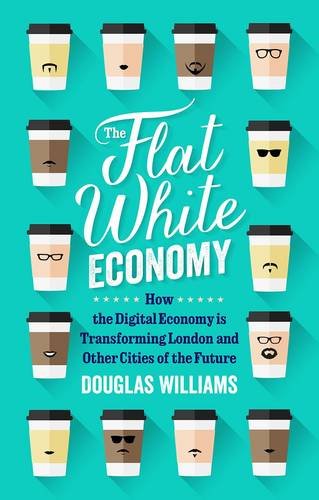
I must warn about this book, as a public service, because it has been unworthily elevated by punditry and puffery. It contains precisely one point of interest: the observation that one postcode in London's trendy Shoreditch saw more new businesses launched last year than Birmingham, or than Newcastle and Manchester combined. That is indeed arresting, and arresting numbers should be interrogated. Were there really 16,000 new enterprises launched in that postcode? How many are shell companies or financial subsidiaries? Given the location, I bet a large number are simply contractors who register companies for tax reasons. They are still doing the same jobs, but now through companies they own that notionally employ them. Alas, none of these theses is considered here. The statistic is just a soundbite, which is true of the book as a whole - a transparent attempt to coin a phrase, as worked so well for Jim O'Neill when he first wrote of the BRICs (Brazil, Russia, India, China).
It gets worse. Despite the book's brevity, he can't help straying off-topic. At one point he muses about London's transport system, which he is an expert on because he travels in London. It is based solely on his impressions, ignoring the entire body of literature on urban transport. He seems to think the only problem with driving in London is bus lanes, ignoring the much bigger issue of parking in city centres. It's a bizarre interlude; space would have been better devoted to saying something relevant about his purported subject.
The book tells us little about the digital economy, but we learn a lot about the wonderful author, who has come late to the humblebrag and deploys it crudely. He was at the centre of things when the City was deregulated, but he only had the one intimate meeting with Margaret Thatcher. He's not just an entrepreneur, but a successful entrepreneur. We're told lots about his consulultancy, but he'd sell it better if his book were a little more thoughtful and less boastful.
 |
| Picture: Amazon |
Richard Bessel Violence: A Modern Obsession Simon & Schuster 2015 £20
By some measures, at least, we live in especially peaceable times. By historic standards inter-personal and inter-societal violence has fallen steadily and is especially low today. This book doesn't seek to enter the accounting debate, but it starts from the intriguing recognition that whatever the objective data show, we are especially obsessed by violence today, and especially repulsed by it.
Thematic chapters cover a range of themes from war to women and children. They're clearly written and sparkle with incident. I thought it suffered from the lack of a unifying vision, buy you may enjoy the detail and consider its kaleidoscopic quality more of an advantage. But at times I thought it verged on superficiality. The concluding chapter ranges widely, and I thought many of the general points needed development. For example, he speculates about the role of wealth in diminishing violence, because people have more to lose. But that's relative. After the Black Death people were relatively very well off - more than had previously been dreamed of - for generations. But there was no discernible critique of violence as a result. Perhaps a higher base was needed. But more plausible, in my view, is that growth is more important than wealth, because growth holds out the premise of a bigger pie to divide later. Rather than fighting over the spoils of war, we can come together to increase the spoils.
There's still much that's thought provoking here; Bessel has tapped a fascinating subject.
Recent lighter reading has included Tim Moore's cycling travelogues, French Revolutions in which he attempts the Tour de France without training, and Gironimo in which he attempts the hardest ever Italian giro - the 1914 - on an authentic period bike. Both tremendous fun; he has my sense of humour, and I'm insane enough to think both undertakings sound like brilliant ideas. Zia Haidar Rahmen's In the Light of What We Know was over-rated. I found it thin and pretentious. It's a novel that's always trying to teach you things, but it's not always right. Although the author briefly worked in finance, a lot of his details are wrong or unconvincing. He doesn't get context.
North Korea Confidential by Daniel Tudor and James Pearson is brilliant. As well informed as is possible on the subject, but also analytically intelligent, clearly written and brief. Fascinating on how such a screwed up society functions, and some of the emerging tensions as private enterprise flourishes on a small scale, and cell phones and western television become more widespread. Matthew Crawford's The World Beyond Your Head was a terrible disappointment. His previous book, Shop Class as Soulcraft is a modern classic, a truly brilliant book that I recommend to everyone. His follow-up is portentous and confused, just a commonplace and confused riff on 'enlightenment culture'.
By some measures, at least, we live in especially peaceable times. By historic standards inter-personal and inter-societal violence has fallen steadily and is especially low today. This book doesn't seek to enter the accounting debate, but it starts from the intriguing recognition that whatever the objective data show, we are especially obsessed by violence today, and especially repulsed by it.
Thematic chapters cover a range of themes from war to women and children. They're clearly written and sparkle with incident. I thought it suffered from the lack of a unifying vision, buy you may enjoy the detail and consider its kaleidoscopic quality more of an advantage. But at times I thought it verged on superficiality. The concluding chapter ranges widely, and I thought many of the general points needed development. For example, he speculates about the role of wealth in diminishing violence, because people have more to lose. But that's relative. After the Black Death people were relatively very well off - more than had previously been dreamed of - for generations. But there was no discernible critique of violence as a result. Perhaps a higher base was needed. But more plausible, in my view, is that growth is more important than wealth, because growth holds out the premise of a bigger pie to divide later. Rather than fighting over the spoils of war, we can come together to increase the spoils.
There's still much that's thought provoking here; Bessel has tapped a fascinating subject.
Recent lighter reading has included Tim Moore's cycling travelogues, French Revolutions in which he attempts the Tour de France without training, and Gironimo in which he attempts the hardest ever Italian giro - the 1914 - on an authentic period bike. Both tremendous fun; he has my sense of humour, and I'm insane enough to think both undertakings sound like brilliant ideas. Zia Haidar Rahmen's In the Light of What We Know was over-rated. I found it thin and pretentious. It's a novel that's always trying to teach you things, but it's not always right. Although the author briefly worked in finance, a lot of his details are wrong or unconvincing. He doesn't get context.
North Korea Confidential by Daniel Tudor and James Pearson is brilliant. As well informed as is possible on the subject, but also analytically intelligent, clearly written and brief. Fascinating on how such a screwed up society functions, and some of the emerging tensions as private enterprise flourishes on a small scale, and cell phones and western television become more widespread. Matthew Crawford's The World Beyond Your Head was a terrible disappointment. His previous book, Shop Class as Soulcraft is a modern classic, a truly brilliant book that I recommend to everyone. His follow-up is portentous and confused, just a commonplace and confused riff on 'enlightenment culture'.
No comments:
Post a Comment